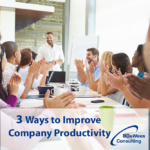Should your HR Managers Focus on Succession Planning?
What would you do in your organization if a key employee resigned, fell ill or had to be fired tomorrow? Would you be prepared? If not, you may end up with an empty C-suite or underqualified people moving into leadership roles because there is no one else to take over. A succession plan may help…
Read MoreHow to Prevent Eye Injuries in the Workplace
It’s easy to get complacent about eyewear when working day-to-day, but not being protected can be more dangerous than you think. The National Institute for Occupational Safety and Health (NIOSH) reports that every day about 2,000 U.S. workers sustain job-related eye injuries that require medical treatment. Ninety percent of on-the-job eye injuries could be avoided if…
Read MoreWorkers’ Compensation and Your Small Business
A workers’ compensation insurance policy provides benefits to employees for injuries and illnesses arising out of and in the course of employment. The policy may provide payment for medical treatment, temporary and permanent disability and death benefits. Workers’ Compensation Insurance is unlike any other type of small business insurance in that it is regulated by…
Read MoreWhy is it Important to Calibrate Test Equipment?
Calibration has been defined by the International Bureau of Weights and Measures as an “Operation that, under specified conditions, in the first step, establishes a relation between the quantity values with measurement uncertainties provided by the measurement standards and corresponding indications with associated measurement uncertainties (of the calibrated instrument or secondary standard) and, in the…
Read MoreIs Your Company Storing Chemicals Safely?
Safe chemical handling requires routine inspections of chemical storage areas and consistent maintenance of your inventory. Even when hazardous materials are out of sight in containers, they should never be out of mind. Here are six ways to help keep your work environment safe when storing hazardous chemicals. Have a plan in place. OSHA’s Occupational…
Read MoreAre You Putting Enough Effort into Your Customer’s Experience?
What sets your company apart from competitors? Developing your company’s unique selling proposition is an important strategy when seeking to differentiate your brand. Companies are starting to take notice that the power of great customer experience has a considerable impact on profit. “89% of companies expect to be competing primarily on customer experience by…
Read More3 Ways to Improve Company Productivity
Are all your employees working to their fullest potential each day? No matter how successful your company is, striving for better productivity should always remain a high-priority. Looking for opportunities to improve efficiency within the company should be a daily task. Here are three great ways to achieve a more productive company. 1. Review and…
Read MoreMake Safe Lifting a Workplace Priority
Lifting and carrying material is a common workplace task no matter which industry you are involved in. Improper lifting is dangerous to workers because it can cause strains, sprains, cuts, fractures, bruising and more. Overexertion injuries – which most often occur when a load is being lifted or otherwise handled – account for 22 percent…
Read MorePosting Requirements for OSHA Final Rule
We recently posted about OSHA’s announcement of their Final Rule, which requires employers to electronically submit the injury and illness data that they are already required to record on their on-site OSHA injury and illness forms. But we want to elaborate more on the requirements. What will this information be used for? This requirement is issued in…
Read MoreDefine Your Process
The official definition of a process is: a series of actions or steps taken in order to achieve a particular end. How does your company define a process? Every successful company needs to have a well-defined series of actions that are consistent when handing work-related issues. If a problem occurs, will your employees know the…
Read More









